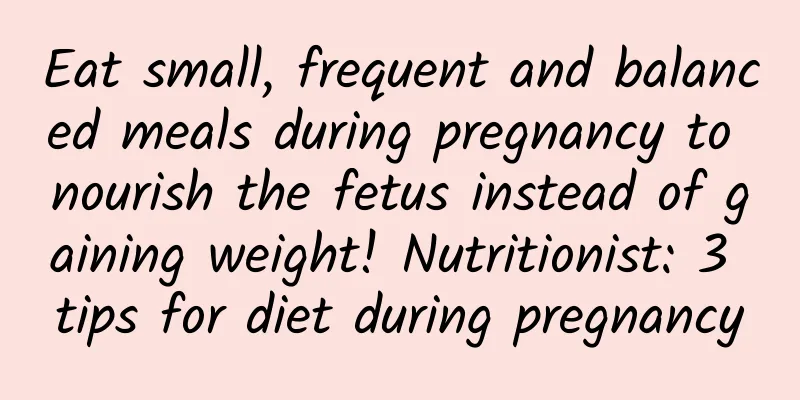Eat small, frequent and balanced meals during pregnancy to nourish the fetus instead of gaining weight! Nutritionist: 3 tips for diet during pregnancy

|
Unbalanced nutrition and overnutrition lead to soaring weight, which is a problem that pregnant mothers need to pay attention to. In particular, this may cause the pregnant mother to gain weight soaring. How to "nourish the fetus without gaining weight"? Nutritionists remind you to refer to the pregnancy diet plan and keep in mind the 3 key points of pregnancy diet to keep your weight within the ideal range, avoid burdening the mother and fetus, and even the risk of related complications. The daily calorie needs of expectant mothers can be based on the recommendations provided by the National Health and Family Planning Administration for the three stages of pregnancy: 1950 calories in the early stages of pregnancy (1-12 weeks), 2250 calories in the middle stages of pregnancy (13-28 weeks), and 2250 calories in the late stages of pregnancy (29-40 weeks). According to the "Eating for a Good Pregnancy" manual newly released by the Ministry of Health and Welfare in December, there are six nutritional principles that pregnant mothers should pay attention to during pregnancy. Folic acid is essential for pregnancy preparation, dietary fiber supplementation is important, iron supplementation during pregnancy is very important, more sun exposure to supplement vitamin D, weight control during pregnancy, and attention to the calcium needed for the baby's growth. It is advisable to gain 10-14 kg of weight during pregnancy. Excessive weight may affect the health of pregnant women and fetuses. Cathay Healthcare Management senior nutritionist Wang Yingti reminded that because pregnant mothers are worried that the fetus is not getting enough nutrition, they may accidentally consume too much, causing the calorie intake to soar and the weight to increase rapidly. Don't think that you have to eat more when you are pregnant. According to the National Health Administration, it is advisable to gain 10-14 kilograms during pregnancy. If you are overweight, it may affect the health of the pregnant woman and the fetus. Here are 3 tips for eating during pregnancy to avoid gaining weight: 【3 tips for diet during pregnancy】 Tip 1: Eat small, frequent, and balanced meals The daily calorie needs of expectant mothers can be based on the recommendations provided by the National Health and Family Planning Administration for the three stages of pregnancy: 1950 calories in the early stages of pregnancy (1-12 weeks), 2250 calories in the middle stages of pregnancy (13-28 weeks), and 2250 calories in the late stages of pregnancy (29-40 weeks). It is worth noting that nutritionist Wang Yingti pointed out that even if you are overweight before pregnancy, it is not suitable to lose weight! If a pregnant woman deliberately diets, it may cause a lack of nutrients and amniotic fluid, affecting the development of the fetus. In the early stages of pregnancy, you may experience morning sickness, nausea, vomiting, and other discomforts. It is recommended to eat whole grain foods in the morning, such as sweet potatoes, potatoes, or multi-grain steamed bread, and avoid drinking beverages on an empty stomach early in the morning. Try to consume soy milk or milk between meals, eat small meals frequently, and choose mainly low-fat foods, such as fish or tofu. You can supplement enough folic acid by consuming green vegetables such as spinach and hollow leaves to prevent fetal nerve damage. Nutritionist Wang Yingti said that if you want to control your weight during pregnancy, you need to understand the weight you should gain at each stage, and you also need to make dietary adjustments depending on the different conditions of pregnancy. You can also seek help from a professional nutritionist to achieve the best state of "healthy fetus without gaining weight." (Photo courtesy of Cathay Hospital) Tip 2: Balanced food intake for three meals In the second half of pregnancy, the pregnant mother's body condition will be more comfortable, which may also cause a good appetite! Nutritionist Wang Yingti mentioned that more attention should be paid to the balanced distribution of the three meals, and all kinds of food should be consumed in appropriate amounts, including starch (rice, noodles, corn, and root vegetables such as sweet potatoes, etc.), high-quality protein (low-fat milk, eggs, low-fat fish and meat), a variety of rich fruits and vegetables (vegetables are better than fruits), and appropriate amounts of unseasoned nuts. In addition, pregnant mothers are prone to constipation or bloating, so dietary fiber intake is important, such as having more than half a bowl of a variety of vegetables at each meal, and two fruits the size of a girl's fist every day; drinking 2000CC of adequate water every day, and reducing the intake of carbonated beverages, can avoid gastrointestinal discomfort. If you want to have some snacks between meals, Wang Yingti recommends choosing fruits, small steamed buns, whole-wheat dumplings, low-fat milk, soy milk or high-fiber soda crackers instead of high-sugar and high-fat snacks, desserts, cakes and sugary shaken drinks. Tip 3: Omega-3 helps your baby grow by supplementing iron and calcium through diet The baby's growth in the late pregnancy period is rapid, and the mother's burden becomes relatively greater. The baby's brain nerve development at this stage can be helped by the mother's intake of fish rich in omega-3 fatty acids (ω-3), such as salmon and tuna. Nutritionist Wang Yingti said that symptoms such as edema, cramps and anemia will appear in the later stages. Avoiding processed foods and pickled high-salt foods can reduce the occurrence of edema; taking in enough calcium from fresh milk, yogurt, dried fish, black sesame seeds, etc. can also reduce cramp symptoms. Finally, a reminder that supplementing with foods containing iron and vitamin C can prevent anemia, such as red meat, dark green vegetables, clams, oysters, guava, oranges, etc. Nutritionist Wang Yingti said that if you want to control your weight during pregnancy, you need to understand the weight you should gain at each stage, and you also need to make dietary adjustments depending on the different conditions of pregnancy. You can also seek help from a professional nutritionist to achieve the best state of "healthy fetus without gaining weight." |
Recommend
Suffering from cervical erosion requires treatment
The vast majority of cervical erosions do not req...
Will the stomach hurt after miscarriage? Check out the following content
Women must take good care of themselves in the ea...
Why does premature ovarian failure occur?
Premature ovarian failure refers to amenorrhea be...
Is the right ovarian cyst painful? What are the symptoms?
Is the right ovarian cyst painful? What are the s...
Does a 5 cm ovarian cyst on the right side need treatment? What foods should not be eaten?
Does a 5 cm right ovarian cyst need treatment? Wh...
Is pregnancy with uterine fibroids life-threatening?
Pregnancy with uterine fibroids may lead to certa...
Paying attention to these 5 aspects can effectively avoid habitual miscarriage
Habitual miscarriage can affect women's healt...
One ectopic pregnancy is equivalent to several miscarriages
An ectopic pregnancy is not the same as a miscarr...
What is the most basic cause of threatened abortion?
What is the most basic cause of threatened aborti...
Why does vomiting occur after abortion? There are 5 possible causes
When choosing a painless abortion, the side effec...
How long does it take to get pregnant after a miscarriage? This article will show you how
Whether it is a natural miscarriage or an abortio...
Doctors rely on various female vaginitis symptoms to diagnose the condition
The symptoms of female vaginitis are mainly cause...
The safe limit of ractopamine in beef is 10ppb
The Food and Drug Administration of the Departmen...
Can drugs for Trichomonas vaginitis be used externally during menstruation?
Can drugs for Trichomonas vaginitis be used exter...
Stewardess loves to eat French fries and braised pork rice, "constipation-type obesity"! Nutritionist's 4 tips helped her lose 6 kg quickly
Rome was not built in a day, and neither is obesi...









